"We are Number Masters! I like number 5 because I am 5! 5 dots, 5 lines, and the number 5 (showing with hands). Double 5 equals 10. I love to learn about 10. I like shapes circles and squares. Circles have no corners and squares have 4 sides and 4 corners."
EYFS Child March 2025
Mathematics at Northstead Community Primary School
Leader: Martine Marsden
Mrs. Marsden holds strategic responsibility for the research, development and implementation of the school’s Mathematics Policy, Curriculum and teaching and learning of maths.
Beyond her work at Northstead, Mrs. Marsden collaborates with the local Maths Hub, supporting the development of high-quality mathematics teaching across the region. She is actively involved in leading professional development for teachers, promoting mastery approaches, and ensuring best practices are shared among schools.
Her leadership and dedication contribute significantly to fostering a robust mathematical foundation for the students at Northstead Community Primary School and beyond.
End of Key Stage Two SATS Results
2022 – 32% (2% at greater depth)
2023 – 42% (8% at greater depth)
2024 – 62% (19% at greater depth)
2025 Predicted Outcome is 65%-70%
Maths at Northstead: A Guide for Parents & Carers
At Northstead Community Primary School, we follow the White Rose Maths approach, which is based on the mastery method. This ensures children develop strong problem-solving skills, fluency, and confidence in maths. Lessons follow a structured pattern and include engaging activities to make learning enjoyable and effective.
How Maths is Taught
Daily Lessons: Maths is taught five times a week for 45 minutes to 1 hour.
Fluency Sessions: Short, additional sessions focus on strengthening number skills.
Step-by-Step Learning: Concepts are introduced using hands-on materials (concrete), then pictures (pictorial), and finally, numbers and symbols (abstract).
Flexibility: Teachers adapt lessons to meet the needs of the children.
Daily Maths Activities
Flashback 4 & Arithmetic: Quick recall tasks 3-4 times a week, revisiting past topics.
Reasoning & Problem Solving: Children discuss maths problems with a partner to build deeper understanding.
Independent Work: Pupils apply their learning, with teachers providing real-time feedback.
Collaborative Marking: Pupils sometimes mark their own or peer’s work to take ownership of learning.
Fluency Sessions (Extra Maths Practice)
EYFS & KS1: Short, fun Mastering Number sessions 3-4 times a week using hands-on materials like counters and rekenreks.
KS2: Children use Times Tables Rockstars (TTRS) and Number Sense activities to develop multiplication skills.
Year 4 MTC (Multiplication Tables Check) Preparation: Practice sessions take place throughout the year, with a parents’ meeting in January.
Years 5 & 6: Weekly fluency sessions help develop arithmetic skills.
Assessment & Support
Daily teacher assessments help identify areas for improvement.
End of unit & termly tests track progress and guide future lessons.
Interventions & Extra Support: Small group sessions help children who need extra practice.
Parental Engagement
We encourage parents to support their child’s maths learning by:
Attending parents’ evenings where maths workbooks are shared.
Using TT Rockstars at home for times tables practice.
Joining MTC & SATs information sessions to understand assessments.
By working together, we can help every child develop confidence and a love for maths!
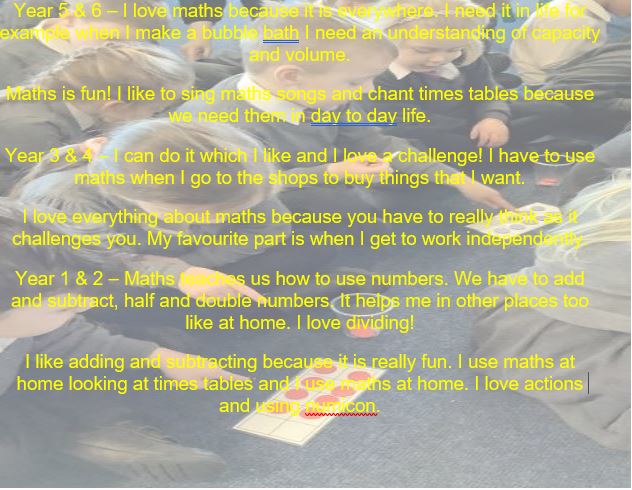
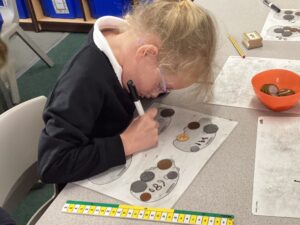
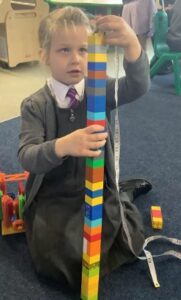
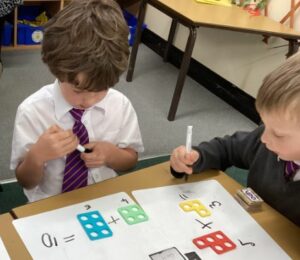
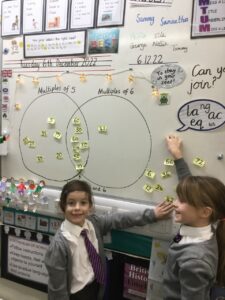
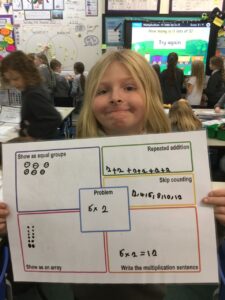
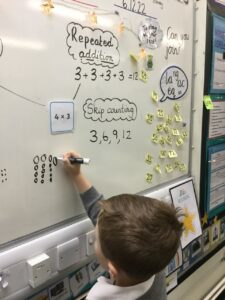
The below is the first of seven videos which give an overview of Mathematics learning in Y1-Y6. Clicking on this video will take you to a series of videos.

